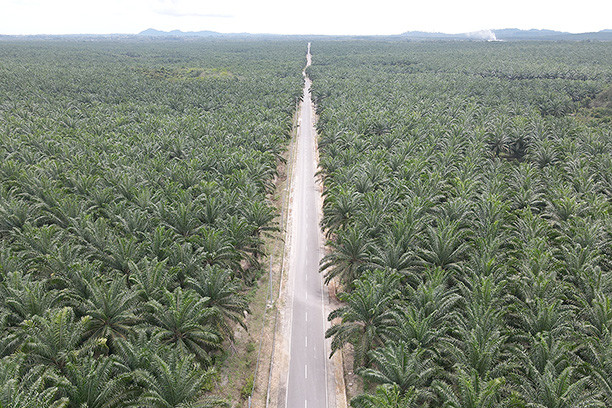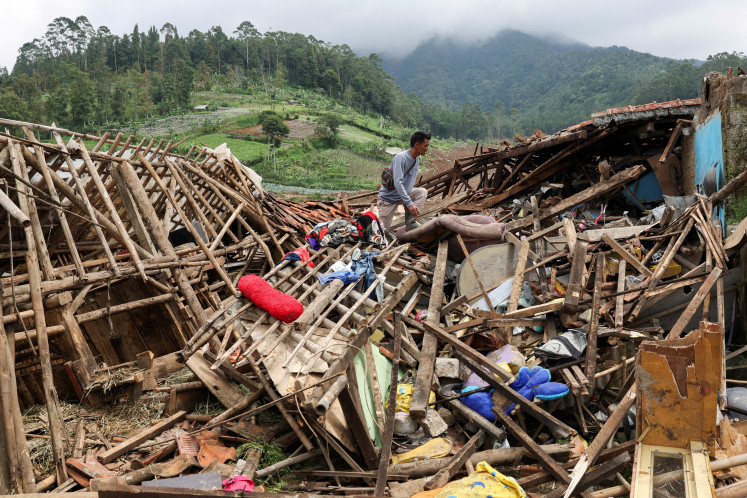Popular Reads
Top Results
Can't find what you're looking for?
View all search resultsPopular Reads
Top Results
Can't find what you're looking for?
View all search resultsPalm oil: More than 750 ISPO certificates issued for producers as of last year
As state-owned plantation company PT Perkebunan Nusantara and a growing number of private corporations receive Indonesia Sustainable Palm Oil (ISPO) certificates, most smallholders still work without such certification.
Change text size
Gift Premium Articles
to Anyone
 An aerial view shows an oil palm plantation in Bulutumbang, Belitung, in August 2020. The government is issuing Indonesia Sustainable Palm Oil (ISPO) certificates for more and more oil palm plantations across the country, but the certificate is not recognized by the European Union. (JP/Donny Fernando)
An aerial view shows an oil palm plantation in Bulutumbang, Belitung, in August 2020. The government is issuing Indonesia Sustainable Palm Oil (ISPO) certificates for more and more oil palm plantations across the country, but the certificate is not recognized by the European Union. (JP/Donny Fernando)
More than 750 Indonesia Sustainable Palm Oil (ISPO) certificates have been issued as of last year, but the vast majority are for private corporations and state-owned plantation company PT Perkebunan Nusantara (PTPN), while smallholders remain largely uncertified.
According to Didi Junaedi, the director for processing and marketing of plantation products at the Agriculture Ministry, 735 of those certificates were for corporate entities.
“There are also 20 ISPO certificates for smallholders, although it was previously voluntary,” Didi said at an online discussion on Monday.
Through the issuance of the certificates, the government seeks to address global concerns over deforestation in crude palm oil (CPO) production.
Presidential Regulation No. 44 of 2020 requires smallholders to get ISPO certificates no later than 2025. For companies, the obligation under the presidential regulation took effect immediately after it was issued.
The government has been seeking to counter what it calls a campaign against Indonesian CPO over alleged environmental damage, especially from the European Union, one of the country’s major trading partners. However, the EU does not recognize the ISPO certificate.
More than one-third of the 16.38 million hectares of oil palm plantations across the country are now certified, according to Rusman Heriawan, an advisor of the National Action Plan for Sustainable Palm Oil Forum.
Nearly 63 percent of the plantations owned by companies have been certified, as have nearly one-third of state-owned plantations, according to an estimate from Rusman, who in the past served as deputy agriculture minister and as the head of Statistics Indonesia (BPS).
By contrast, a mere 0.19 percent of smallholder plantations have been certified.
“This is still very uneven,” Rusman admitted. “Meanwhile, we cannot exempt smallholder plantations in the context of the entire palm oil industry. It has to be everyone.”
Smallholders account for around 41 percent of the total plantation area in Indonesia, which stretches across 26 provinces, according to Rusman.
Riau has the largest oil palm plantation areas with a total of 2.43 million ha, followed by West Kalimantan, North Sumatra, Central Kalimantan and South Sumatra, according to data from the Agriculture Ministry. But the productivity was highest at almost 5 tons per ha in North Sumatra.
The government needs to resolve deforestation resulting from opening new oil palm plantations, says Diah Suradiredja of Yayasan Kehati, a foundation that collects and manages grants and other support to preserve the country’s biodiversity.
She said 3.4 million ha of plantations were located inside forest areas, which are officially off-limits for cultivation.
“Why do we have to be concerned about this? Because this is one of the issues raised and has put us under pressure; we have to solve issues related to deforestation,” said Diah.
Indonesian CPO exports were down 41.10 percent year-on-year at 418,259 tons in March, according to the latest BPS data, the majority of which was shipped to India.









